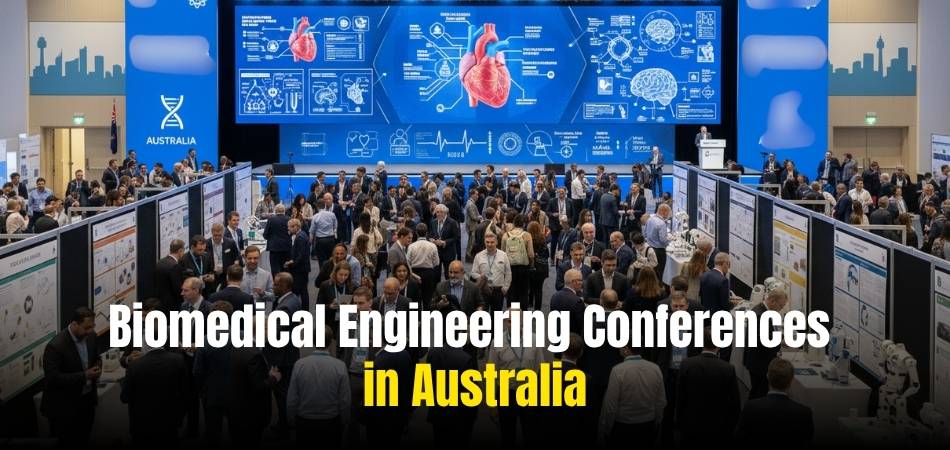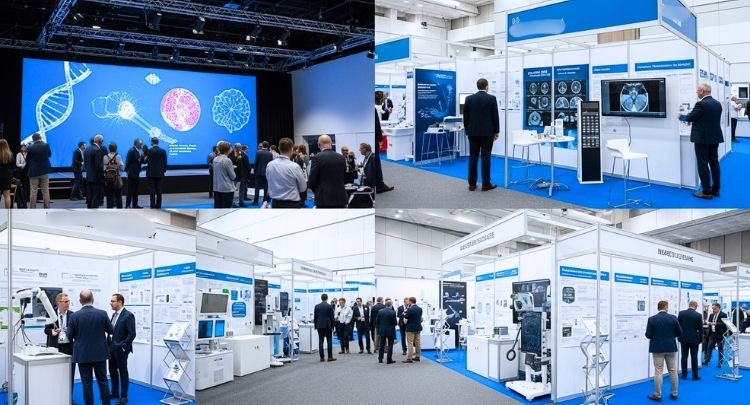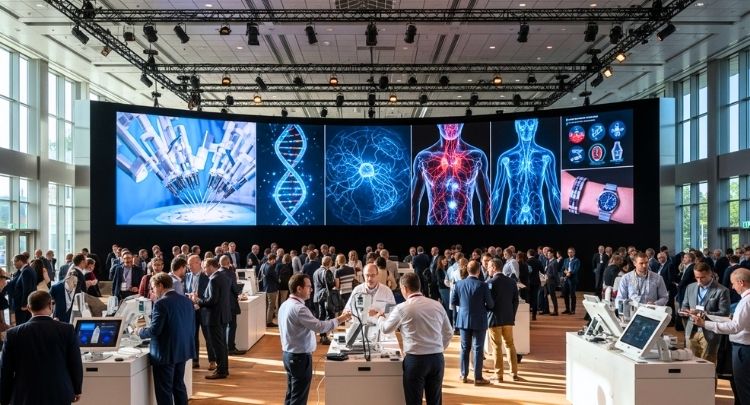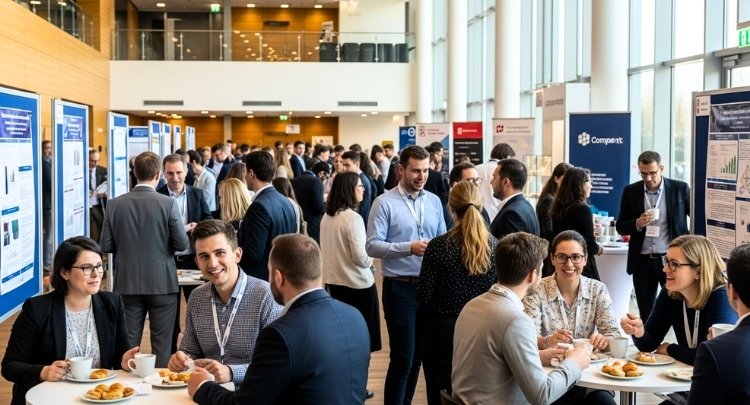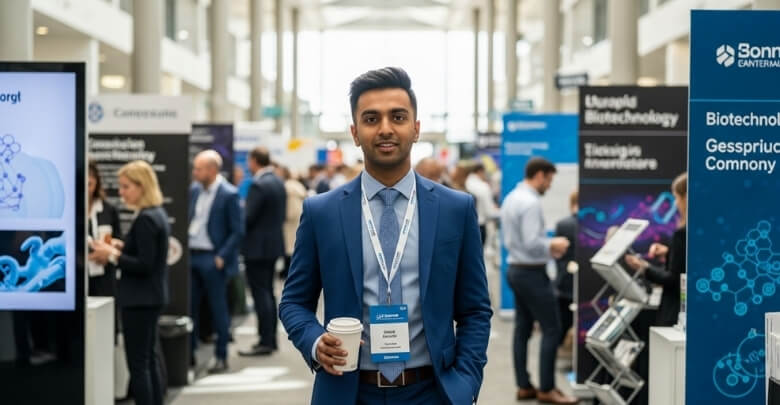Biomedical engineering is at the heart of innovation, blending medicine, technology, and engineering to improve human health. Conferences play a vital role in this field, offering researchers, students, and professionals the chance to exchange knowledge, showcase new discoveries, and connect with experts from around the globe. Australia has become a thriving hub for such events, attracting pioneers in biomedical sciences and healthcare technology.
If you’re wondering what the top 6 biomedical engineering conferences in Australia are, some of the most prominent include the 43rd Global Conference on Biomedical, Bioengineering, and Biomedical Engineering and the Annual Mutational Scanning Symposium. Each focuses on groundbreaking research, medical advances, and health innovations.
You are invited to follow along as we explore the full list in more detail right here!
Top 6 Biomedical Engineering Conferences in Australia
Science and technology are changing health in exciting ways, and conferences bring people together to share ideas. These events are where researchers, doctors, and engineers meet to discuss discoveries and new tools. They make learning fun and connect people across the world. Australia is hosting some of the biggest biomedical conferences that are worth knowing about.
- 43rd Global Conference on Biotechnology, Bioengineering, and Biomedical Engineering (GCBBBE) | Dates: November 14-16, 2025 | Location: Sydney, Australia
- Annual Mutational Scanning Symposium | Dates: March 25-27, 2026| Location: Melbourne, Australia
- BioEM 2026 (Bioelectromagnetics) | Dates: July 2, 2026 | Location: Cairns, Queensland, Australia
- SMBE NSW Country Technicians Training Seminar and Conference | Dates: March 22nd to 25th 2026 | Location: Albury, NSW, Australia
- International Conference on Bioengineering (ICBE) | Dates: July 15-16 2026 | Location: Sydney, Australia
- International Conference on Biomedical Engineering and Biotechnology (ICBEB-2026) | Dates: November 4-7, 2025 | Location: Toowoomba, Australia
1. 43rd Global Conference on Biotechnology, Bioengineering, and Biomedical Engineering (GCBBBE)
The 43rd Global Conference on Biotechnology, Bioengineering, and Biomedical Engineering (GCBBBE) will be held in Sydney on November 14-16, 2025. This is a huge international event where experts and students gather to talk about the latest medical technologies. Among the many important conferences in Australia, this one stands out because it brings together researchers from many countries, giving people a chance to see how science is making lives better. If you want to learn about future health solutions, this is a great event.
2. Annual Mutational Scanning Symposium
This Annual Mutational Scanning Symposium is happening on March 25-27, 2026 in Melbourne. This event focuses on how changes in genes can affect health and disease. Scientists will share research about genetics, health conditions, and possible treatments. It is an excellent chance to understand how tiny changes in DNA can make a big difference in medicine. Students and professionals will both find this conference exciting.
3. BioEM 2026 (Bioelectromagnetics)
BioEM 2026 will take place in Cairns, Queensland, on July 2, 2026. This conference is all about bioelectromagnetics, which studies how electricity and magnetism affect living things. People here discuss topics like medical imaging, health devices, and how electromagnetic fields interact with the human body. It’s a unique conference that connects engineering with health in surprising ways. If you like science and energy, this event will be very interesting.
4. SMBE NSW Country Technicians Training Seminar and Conference
The SMBE NSW Country Technicians Training Seminar and Conference will be held in Albury from March 22nd to 25th 2026. This seminar focuses on training technicians who play a key role in biomedical engineering. It is a place for learning, sharing skills, and talking about new tools. Many hands-on sessions make this conference different, as it’s not just about talks but also about practical work. It’s perfect for people who enjoy working with equipment.
5. International Conference on Bioengineering
This International Conference on Bioengineering (ICBE) from the WASET series will be held in Sydney on July 15-16, 2026. This conference covers all areas of bioengineering, including new devices, medical machines, and health systems. It gives experts and students a stage to present their research and learn about new developments. If you are curious about the ways engineering can improve health, this conference is for you.
6. International Conference on Biomedical Engineering and Biotechnology
The International Conference on Biomedical Engineering and Biotechnology (ICBEB-2026) will be hosted in Toowoomba on November 4-7, 2025. It combines two important fields: biomedical engineering and biotechnology. Attendees will learn about research in medical devices, health technology, and biology working together. It’s an exciting event where ideas from both engineering and life sciences are shared. This makes the conference useful for anyone who enjoys both technology and biology.
The Purpose of Biomedical Conferences
Science keeps growing every day, and people always look for better ways to improve human health. Conferences are special events where ideas and new findings are shared in an easy and friendly way. These events help connect people who are curious and passionate about health. Here is the purpose of these conferences.
Sharing Knowledge
One of the main goals of biomedical conferences is to share knowledge about health and technology. Experts present their studies, and students get to learn from them. This helps people understand how science is moving forward. It also shows what new medical solutions are being created.
Meeting Experts
Conferences give people the chance to meet experts from different countries and backgrounds. Doctors, scientists, and engineers attend to discuss their work. These conversations can inspire young learners who want to work in similar fields. Meeting experts also makes science feel more real and exciting.
Learning New Skills
Workshops and training sessions at conferences allow participants to learn useful skills. These can be about using medical equipment, testing new tools, or understanding research methods. Such sessions make learning fun and practical. They also prepare people for real-world applications of science.
Encouraging Innovation
Biomedical conferences are places where new ideas are encouraged and supported. Researchers bring fresh concepts that can change the future of medicine. Talking about these ideas helps improve them further. It gives everyone hope for better treatments and healthier lives ahead.
Building Connections
Conferences help people build connections with others who share similar interests. These connections can later turn into collaborations or friendships. Working together makes solving problems easier. Networking in this way helps the scientific community grow stronger and more united.
Understanding Trends
Attending biomedical conferences also helps people understand current health trends. From new machines to medical studies, everything is discussed. This helps participants stay updated with what is happening in the field. It ensures that they do not miss out on important advancements.
Inspiring Students
Conferences are not just for experts; they also inspire students and beginners. Listening to real stories of discoveries can motivate them to study harder. It gives them a clear idea of how science can save lives. Such inspiration can shape their future career choices.
Key Topics Discussed at Biomedical Conferences in Australia
Biomedical conferences in Australia bring people together to learn, share, and explore new medical ideas. These events cover many important topics that shape the future of health and science. Below are some of the main areas often discussed.
Medical Technology
- New machines and devices help doctors treat patients faster, and experts explain how they improve patient safety.
- Speakers describe the design of hospital tools, showing how simple changes can make treatment more effective.
- Engineers and doctors discuss the cost of building devices and how this affects patient care everywhere.
Genetics and DNA
- Researchers show how DNA changes cause health issues, and they share methods for testing these genetic risks.
- Scientists explain gene editing tools that might repair damaged DNA and lead to new medical treatments.
- Sessions include stories about how gene studies reveal hidden diseases, helping people understand health in clearer ways.
Tissue Engineering
- Doctors and researchers describe methods for growing human tissue that can replace damaged parts of the body.
- Presentations highlight real cases where tissue engineering has improved healing for patients with severe injuries.
- Experts also share challenges like cost and safety, showing why this area needs constant research and updates.
Biomedical Imaging
- Imaging experts explain new ways to scan the body safely, helping doctors find diseases much earlier.
- Presenters compare modern imaging with older techniques, showing how accuracy improves with better technology.
- Sessions include real examples where imaging detected hidden health issues and helped save patient lives on time.
Biotechnology Advances
- Scientists share details about medicines created using biotech methods, explaining how these drugs work effectively.
- Talks include food-related biotechnology and how it connects health with better nutrition for communities worldwide.
- Participants learn how biotech combines biology and engineering to create tools that improve treatment success.
Health Data Science
- Experts discuss how health data is collected and stored safely without losing important patient information.
- Sessions explain how data helps track diseases, predict health problems, and improve public medical plans.
- Presenters also highlight concerns about privacy and security, showing why rules and safe systems are needed.
Regenerative Medicine
- Talks describe how stem cells can help repair damaged organs and support long-term recovery in patients.
- Researchers present studies on new methods that use body cells to restore lost or weakened functions.
- Experts explain challenges like testing and cost, but remain hopeful about future benefits for global healthcare.
Future Trends
- Presenters explore wearable technology and explain how small devices can track health accurately every day.
- Sessions highlight the role of artificial intelligence in predicting illnesses and improving hospital planning.
- Talks also include stories about space medicine, showing how astronauts’ health research benefits life on Earth.
What Types of Technological Advancements Are Showcased in Biomedical Conferences?
Science keeps moving forward, and technology is a big part of improving health and saving lives. Conferences are the perfect place to see new ideas come alive in front of curious minds. They give people the chance to learn in fun ways. These events show how technology connects science and medicine to make life better.
Medical Devices
New medical devices are always a highlight at these conferences. Machines that help doctors with surgeries or patient care are often shown. Experts explain how these devices are designed and tested before reaching hospitals. Such technology proves how tools can change lives.
Imaging Technology
Imaging technology is another major focus. Conferences present advanced scanning machines that can look inside the body safely. Speakers discuss how these machines can find diseases early and improve treatments. Real examples make the topic easier to understand.
Robotics in Medicine
Robotics plays a huge role in modern healthcare. At conferences, people learn how robots assist in surgeries. They also see how robotic tools improve accuracy and reduce risks for patients. This makes surgeries safer and recovery faster.
Wearable Health Tech
Wearable devices are growing in popularity. These include smartwatches and health trackers that measure heart rate or sleep patterns. Presenters explain how such tools help monitor health daily. They also show how this data can guide doctors in treatment.
Regenerative Tools
Regenerative tools are also showcased. These include machines that support tissue growth or stem cell development. Presenters talk about how these tools may heal injuries or repair organs. This field is still growing but offers strong hope.
Biotech Innovations
Biotechnology brings many new advancements. Medicines and vaccines developed with modern methods are explained at these events. Speakers share how biotech research connects biology and technology to solve health problems. This helps people understand future treatments in simple ways.
Data and AI Tools
Data and smart tools are part of health conferences as well. They show how information systems help doctors make decisions quickly. Presenters also highlight safety rules to keep data secure. This mix of technology and healthcare supports better planning.
What Will You Need to Attend Biomedical Conferences in Australia?
Attending a biomedical conference in Australia can be exciting and full of learning. These events allow students, researchers, and professionals to connect. Being ready with the right things will make the experience smooth and enjoyable. Here are some essentials you will need:
- Conference Ticket: A valid ticket is required for entry, which can be bought online before the event or sometimes directly there.
- Travel Documents: International visitors must carry a valid passport and visa, while local attendees simply need proper identification cards.
- Accommodation Plan: Hotels near the venue should be booked early, because conference seasons often bring crowded stays and higher costs.
- Notebook and Pen: Writing important notes during presentations helps remember details later and keeps track of useful points shared by speakers.
- Digital Devices: A tablet or laptop can be handy for accessing schedules, slides, and sometimes virtual sessions available through apps.
- Formal Clothing: Conferences usually expect smart clothing, so neat outfits help make good impressions and show respect toward speakers.
- Health Essentials: Carrying basic medicines, sanitizers, or masks is helpful, especially during long events with many people gathered together closely.
How Attending a Biomedical Conference Can Benefit You?
Science and technology are changing health in exciting ways, and conferences bring people closer to these important ideas. Attending such events opens doors to learning and connecting with others. They are not just about listening but also about sharing. These moments can shape your future by inspiring you in unique ways.
Learning Opportunities
Conferences give you the chance to hear directly from experts about the latest research and discoveries. You can listen to talks, join workshops, and take notes. Each session explains complicated topics in simple ways. It’s like a classroom with real-life applications.
Meeting Experts
These events allow you to meet doctors, engineers, and scientists who work in different areas of health. Asking them questions gives you clear answers. Talking to experts can help you understand difficult subjects better. Meeting them also inspires confidence in learning.
Building Connections
Conferences help you connect with students and professionals who share the same interests. You can make friends and future partners. Working together later on projects becomes easier. These connections can be very useful for growth in education and career.
Exploring Technology
You get to see machines and devices that you usually only read about. Demonstrations show how they actually work. This makes learning exciting and memorable. Watching new technology in action also helps you understand science better.
Improving Knowledge
Each conference expands what you already know by introducing new ideas. Experts share detailed research in simple terms. You leave with more information than before. This helps you feel updated about science and medicine.
Career Guidance
Attending conferences can give you ideas about different career paths. Experts often talk about their own work. Their advice can guide you to choose subjects for study. It helps you see what is possible in the future.
Boosting Confidence
Speaking or asking questions at a conference can build your confidence. You learn how to express your thoughts clearly. Confidence grows when you share your ideas with others. This skill will help in school and beyond.
Real Inspiration
Hearing real stories about discoveries can inspire you. These moments push you to dream big and work harder. Inspiration often comes from seeing what others have achieved. Conferences are filled with such moments that stay in memory.
What to Do to Build Strong and Reliable Networks at Biomedical Conferences?
Biomedical conferences are not only for learning but also for meeting people who can support your growth. Making reliable connections requires planning, effort, and good communication. Here are some practical steps you can take to build strong networks:
Be Prepared
- Prepare a short introduction about yourself that explains your background clearly and makes people remember you easily later.
- Carry simple contact cards with your name and email since they make exchanging details faster and more effective.
- Read about speakers in advance because knowing their work helps you ask meaningful questions during casual conversations.
Join Sessions
- Sit in different sessions instead of staying in one because this increases the chances of meeting varied people.
- Ask questions politely during talks since this shows interest and helps speakers recognize you after their presentation ends.
- Take short notes about discussions as they help when reconnecting with participants and recalling specific topics later.
Visit Booths
- Walk through exhibition booths carefully since many researchers and companies share their work and welcome useful conversations.
- Ask simple questions about displayed technology to show curiosity and begin natural discussions without feeling awkward.
- Exchange details after conversations because both discussions often lead to long-term collaborations or helpful connections.
Use Breaks
- Coffee and lunch breaks provide easy chances to talk casually, and friendly conversations often create stronger bonds.
- Smile and start with small topics since light discussions build comfort before moving toward professional conversations.
- Join group chats instead of standing alone because groups often welcome new voices and connections naturally.
Attend Socials
- Evening mixers or dinners are planned for networking, and they allow more relaxed conversations compared to formal sessions.
- Introduce yourself confidently while keeping conversations simple so people can easily remember you later.
- Stay engaged in activities or games because shared experiences make bonds stronger and more memorable.
Follow Up
- Send a quick email after the conference because this keeps your name fresh in the person’s mind.
- Mention specific topics from your earlier discussion to remind them of your shared interests and maintain relevance.
- Stay in touch over time since small updates keep the connection strong without feeling forced.
Be Genuine
- Show real interest in people instead of focusing only on what benefits you might receive later.
- Listen carefully to what others say, because respect and attention build trust faster than rehearsed conversations.
- Share your own ideas openly since honesty often creates stronger professional friendships and partnerships.
Tips for Making the Most Out of Your Biomedical Conference in Australia
Attending a biomedical conference is an exciting chance to learn new things and meet people with similar interests. These events are full of ideas, opportunities, and discussions that can help you grow. Preparing well makes the entire experience smoother. With the right steps, you can enjoy every moment of it.
Plan Ahead
Before going, look at the schedule and decide which sessions you want to attend. This helps save time and energy. Planning also makes sure you don’t miss talks that are important to your interests. A little preparation always helps you stay focused.
Join Activities
Conferences are not only about lectures but also about workshops and group sessions. Joining these activities makes learning more fun. You can ask questions directly and share ideas with others. These small sessions often leave the biggest impact.
Take Notes
Keeping a notebook or using your phone to write down key points is very useful. Notes help you remember details later. They also allow you to share information with friends or classmates. Writing things down makes learning easier and clearer.
Meet People
Take the chance to talk to new people during breaks or after sessions. Simple introductions can lead to long conversations. Meeting people from different places also gives you new perspectives. Networking at conferences is one of the best parts.
Explore Technology
Spend time at stalls or exhibitions where new medical tools and devices are displayed. Seeing technology in action is exciting. It makes science feel more real than just reading about it. These moments give you fresh interest in learning.
Stay Curious
Always ask questions whenever you don’t understand something. Curiosity shows you are eager to learn. Speakers often enjoy answering thoughtful questions. Being curious helps you get more value from every session.
Relax and Enjoy
Conferences can be long, so take breaks when needed. Eating well and resting keep your energy levels high. A fresh mind helps you focus better during talks. Enjoy the experience instead of rushing through everything.
Frequently Asked Questions About Top Biomedical Conferences in Australia
Biomedical engineering conferences in Australia bring together experts, students, and researchers from across the globe. These events highlight the latest in medical science and technology. Here are some frequently asked questions to help you understand them better.
What Makes Biomedical Conferences Different From Regular Science Events?
Biomedical conferences focus only on health, technology, and engineering. They include medical devices, imaging, genetics, and biotechnology. Unlike general science events, these focus more on improving healthcare systems and technologies. They connect doctors, researchers, engineers, and students around common health goals.
Are These Conferences Open To Students?
Yes, most biomedical conferences welcome students. They can attend workshops, lectures, and poster presentations. Students also get a chance to meet experts and learn directly from real research. These events are a valuable learning space outside of classrooms or textbooks.
Do Conferences Provide Certificates For Attendees?
Many biomedical conferences provide participation or presentation certificates. These documents are useful for academic records and resumes. Certificates show involvement in global discussions about biomedical research. They also help students and professionals demonstrate their dedication to medical science advancements.
How Long Do Biomedical Conferences Usually Last?
Most biomedical conferences last two to four days. During this time, participants attend lectures, workshops, and networking events. Some include exhibitions showing new technology. Each day is filled with sessions designed to share knowledge, research, and future possibilities in medicine.
What Kind Of People Attend These Conferences?
Biomedical conferences attract a wide range of people. Doctors, engineers, researchers, professors, students, and industry leaders attend. Each person shares unique knowledge or experiences. This mix creates a balanced learning environment where everyone can gain and exchange helpful insights.
Do These Conferences Cover Global Research Or Only Australian Studies?
Although hosted in Australia, these conferences cover both global and local research. Experts from many countries present their work. International studies are compared with Australian projects. This blend helps participants understand broader perspectives while seeing how local research contributes worldwide.
Are There Chances To Present Research At These Conferences?
Yes, many conferences allow participants to present their research through papers or posters. Presenting builds confidence and recognition. It also provides feedback from experts. Students and professionals benefit by showcasing their work to a global audience in biomedical fields.
How Are Conference Venues Usually Selected?
Venues are chosen based on size, accessibility, and available facilities. Cities like Sydney, Melbourne, and Brisbane often host major events. These places provide modern halls, hotels, and transport options. Organizers pick venues that make travel and participation easy for everyone.
Can Attendees Expect Hands-On Training Sessions?
Yes, many conferences include workshops and hands-on sessions. These allow participants to practice using biomedical tools and devices. Practical sessions make learning interactive and memorable. Attendees find these opportunities helpful for gaining real skills alongside theoretical knowledge from lectures.
Are Virtual Options Available For International Attendees?
Several conferences now offer hybrid models, including virtual participation. Online attendees can watch live sessions and join discussions. This helps those unable to travel still benefit from the knowledge shared. It makes global access to biomedical learning more inclusive.
Concluding Thoughts
Biomedical engineering conferences in Australia bring people together to learn and share. They show new ideas that can change health and medicine. At these events, students and experts meet, talk, and explore technology that improves lives. The top 6 biomedical engineering conferences in Australia are important because they highlight science, innovation, and teamwork.
Each conference gives a chance to listen, ask questions, and build useful connections. They are not only about knowledge but also about inspiration. Attending these events helps you see how science shapes the future of healthcare in simple and powerful ways.

